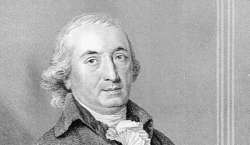Great citizen of Morąg (1744–1803)
The Biographical Exhibition dedicated to Johann Gottfried Herder, the greatest citizen of Morąg, born here, died in Weimar, is presented in two large rooms of the 1st floor. Herder spent the first 18 years of his life in Morąg.
The exhibition has been prepared by Nationale Forschungs- und Gedenkstätten der Klassischen Deutschen Literatur in Weimar, currently Stiftung Weimar Klassik. Its fundamental matrix is shaped by the main stages and places of longer stays of the humanist.
The stages of development of Herder's thought are illustrated with exhibits presenting his entire literary output, complemented by artistic objects. Several portraits of Herder, images of his spouse, significant people who had a personal or spiritual relationship with the philosopher, are presented here. Among others, of Immanuel Kant and Wolfgang Goethe. Goethe holds a special place here. Presented are also ethnographic exhibits, illustrating some of Herder's most important achievements: translations and editions of folk songs of different peoples of Europe and the world, which had a great influence on romantic literature in Germany and Europe. A room-office of the scholar from the Weimar period has also been arranged, familiarizing the climate in which his most important works were created. He studied philosophy and theology in Königsberg. Immanuel Kant and Johan Georg Hamann were a great influence. He started his pastoral and teaching work in Riga. It is also where he published his first written works. He soon left to France in order to "see the world and get to know himself" – as he wrote. In Strasbourg he met young Goethe, who had been greatly influenced by Herder's "Treatise on the Origin of Language". Namely, it focused the attention of future romantics to the role of ancient Greek, Celtic or Old Norse poetry. After a short stay in Bückeburg, he settled for almost thirty years in Weimar, holding high ecclesiastical offices. It is there that his greatest works were created, i.a. "Ideas for the Philosophy of History of Humanity" and "The Voices of Peoples in Songs". The treatise on Slavic peoples in one of the volumes of "Ideas upon Philosophy", where he describes with great fondness the culture of that peoples, turned out to be significant to Poles and all the Slavic peoples.
The exhibition has been prepared by Nationale Forschungs- und Gedenkstätten der Klassischen Deutschen Literatur in Weimar, currently Stiftung Weimar Klassik. Its fundamental matrix is shaped by the main stages and places of longer stays of the humanist.
The stages of development of Herder's thought are illustrated with exhibits presenting his entire literary output, complemented by artistic objects. Several portraits of Herder, images of his spouse, significant people who had a personal or spiritual relationship with the philosopher, are presented here. Among others, of Immanuel Kant and Wolfgang Goethe. Goethe holds a special place here. Presented are also ethnographic exhibits, illustrating some of Herder's most important achievements: translations and editions of folk songs of different peoples of Europe and the world, which had a great influence on romantic literature in Germany and Europe. A room-office of the scholar from the Weimar period has also been arranged, familiarizing the climate in which his most important works were created. He studied philosophy and theology in Königsberg. Immanuel Kant and Johan Georg Hamann were a great influence. He started his pastoral and teaching work in Riga. It is also where he published his first written works. He soon left to France in order to "see the world and get to know himself" – as he wrote. In Strasbourg he met young Goethe, who had been greatly influenced by Herder's "Treatise on the Origin of Language". Namely, it focused the attention of future romantics to the role of ancient Greek, Celtic or Old Norse poetry. After a short stay in Bückeburg, he settled for almost thirty years in Weimar, holding high ecclesiastical offices. It is there that his greatest works were created, i.a. "Ideas for the Philosophy of History of Humanity" and "The Voices of Peoples in Songs". The treatise on Slavic peoples in one of the volumes of "Ideas upon Philosophy", where he describes with great fondness the culture of that peoples, turned out to be significant to Poles and all the Slavic peoples.








